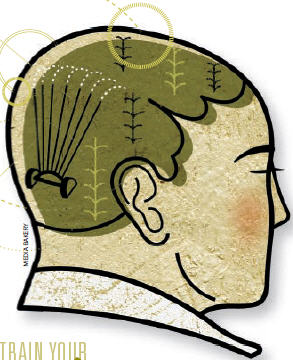Healthy ways to protect your memory
 IF YOU FREQUENTLY lose your keys and forget where you parked your car, you may fear something more than just a “senior moment.”
IF YOU FREQUENTLY lose your keys and forget where you parked your car, you may fear something more than just a “senior moment.”
That’s unlikely. But memory lapses are a good reminder that brain health is important. There are many ways to protect your cognitive capabilities as you age. Research shows what’s good for your heart is also good for your brain. Diet, exercise, and intellectual and social activities can all safeguard your smarts.
Reduce risks
Doctors use the term “metabolic syndrome” to describe a group of interrelated risk factors for heart disease and diabetes, including body weight, belly fat, blood lipid levels and insulin resistance. Being overweight slows you down physically and mentally because it interferes with your body’s ability to use sugars, fats and protein optimally.
Blood sugar spikes can interfere with memory. Research shows even moderate increases in blood sugar reduce blood flow to a part of the brain responsible for storing new memories. Doctors say it’s best to restrict refined carbohydrates and sweeteners, but the occasional treat is OK. Slow the sugar rush with healthy fats like nuts. Dietary fats help stabilize blood sugar.
If you are significantly overweight, have a family history of diabetes or had gestational diabetes during pregnancy, see your doctor for screening. Diabetes is a major risk factor for Alzheimer’s and memory loss may occur years before an individual is diagnosed with diabetes.
Be proactive. Monitor your blood pressure, cholesterol, blood sugar and weight to make sure they’re within a healthy range, especially if you’ve received a wake-up call from your doctor. These conditions can be smoldering along, causing significant damage. Intervene early and follow up regularly.
Eat smart
If your diet needs a brain-boosting tuneup, try a Mediterranean meal plan. Monounsaturated oils—found in olives, nuts and avocados—and dark leafy greens offer high doses of vitamin E and folic acid, two nutrients that reduce the risk of dementia. Spinach sautéed in olive oil may be the ultimate brain food. Serve it with fish and a glass of red wine.
A number of long-term studies show the consumption of fish prevents cognitive decline. Fish oil supplements containing omega-3 fatty acids may be beneficial as well. Studies show they increase brain volume and cognitive functioning, and decrease mental fatigue.
When it comes to dementia prevention, moderate wine consumption—one glass daily for women, two for men—is better than none at all. Just don’t drink too much. Excessive alcohol use is associated with decreased brain volume and memory loss.
A number of other nutrients may have bio-protective effects. Mounting evidence suggests carotenoids—substances found in colorful fruits and vegetables such as carrots, tomatoes and mangoes—may be beneficial. Aim to eat a rainbow every day.
Exercise regularly
Moving the body also maintains the mind. Formerly sedentary adults who engaged in three 40-minute aerobic exercise sessions each week increased their brain volume in areas related to attention and memory during a study by researchers at the University of Illinois. Stretching and toning exercises didn’t have the same benefits.
Cardiovascular exercise increases blood flow to the brain and decreases your risk of stroke. That’s important. Vascular damage is the second most common cause of dementia. (Alzheimer’s disease is No. 1.)
Damage to the small blood vessels in the brain can lead to cognitive decline even if you don’t have a stroke. A healthy circulatory system supplies nutrients to the brain and removes waste products.
Choose an enjoyable activity that allows you to hit and sustain your target heart rate. Walking at a brisk pace may be enough. Make exercise a social event if possible. You’ll be more likely to stick to your workout plan, and people who stay active socially have better mental acuity.
Mind your emotions
Don’t neglect your mental health. Even mild depression can affect your cognitive functioning in a negative way. Stress and anxiety create mental clutter and prompt the release of stress-related chemicals, such as cortisol. Chronically high levels of cortisol can cause damage to the hippocampus, a part of the brain responsible for learning and memory. The good news? Studies show some memory impairment is reversible.
Build your coping skills so you feel well emotionally and physically. Exercise and adequate sleep, along with massage, meditation and spiritual practice, can help you handle stress effectively. Your brain health depends on it.
Cardiovascular exercise increases blood flow to the brain and decreases your risk of stroke.
Brain growth
New brain cells are continually generated—even in adults—through a process called neurogenesis. Most new cells are born in the hippocampus, a structure involved in learning and memory. Studies show exercise, learning and stress-relieving activities enhance neurogenesis and promote new-cell survival.

